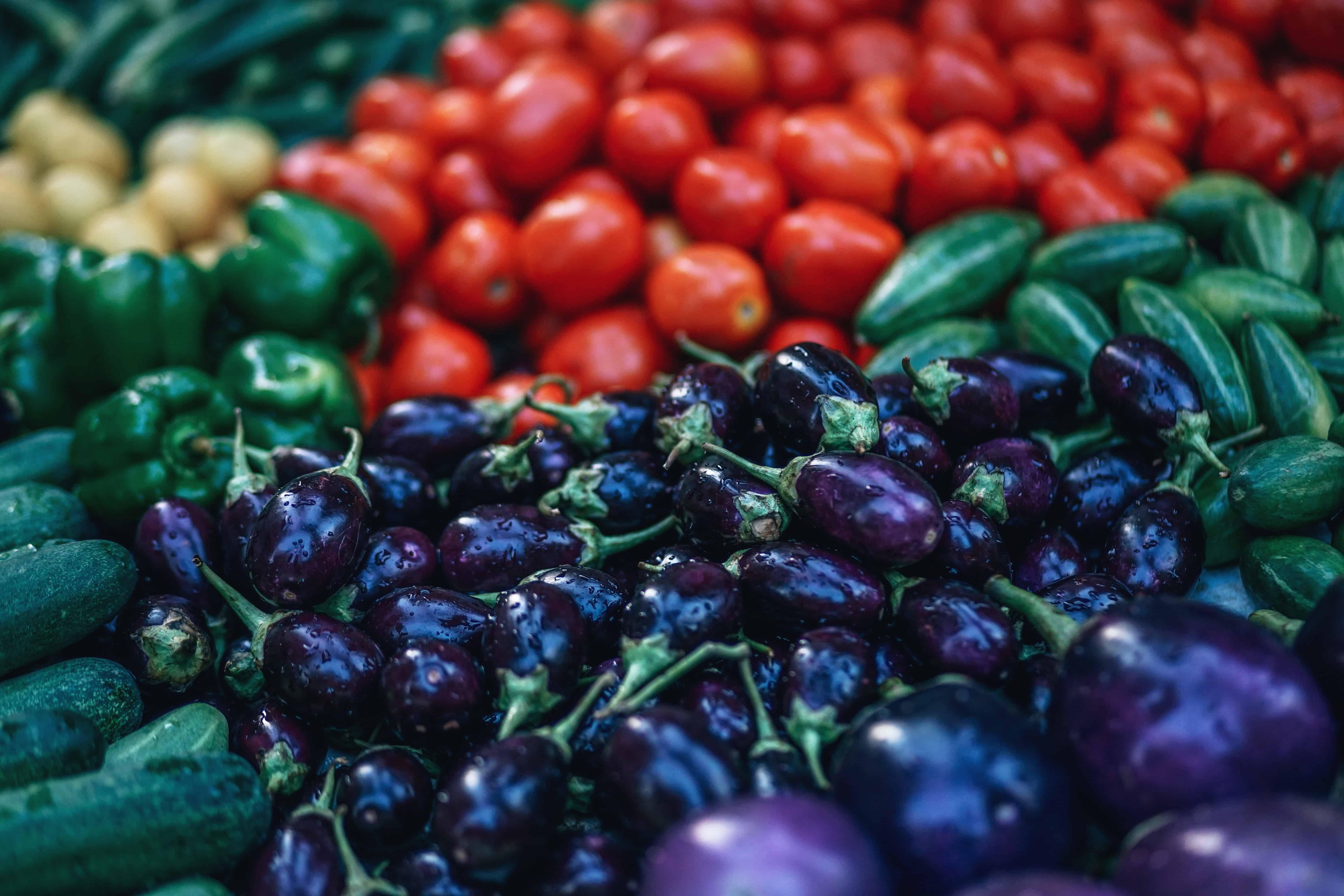War on Waste: How Food Rescue Charities Are Fighting Food Waste
The recent ABC television series War on Waste aired last month, and suddenly everyone is talking about waste. Which, in my view, is a good thing. A great thing! As it should be ;) The more conversations we have around waste, the better.
I watched the series myself and thought it was well made, informative and motivational. It did a great job of addressing the problems. The problems need talking about, definitely. But I felt it only touched on the solutions. Which, maybe, was a missed opportunity. In my view, there are plenty of solutions, and we need to talk about these as much as (or more than!) the problems!
No doubt there wasn’t time for everything. (It was only 3 episodes, after all!)
So I thought I’d explore some of the solutions here. Today, I’m going to talk about food waste, and more specifically, what people are doing about.
Food waste is a huge issue in Australia, with around 40% of food being discarded before it leaves farms, and shoppers throwing away 20% of everything they buy (the equivalent of 1 bag of shopping in 5). The UK reported similar statistics with their Hugh’s War on Waste series last year, saying 1/3 of food produced is never eaten. The figure is similar in the U.S.
The supermarkets are linked to a lot of this waste. With their strict cosmetic standards, unbalanced supplier contracts in favour of the retailer, pre-packaging loose items (where they control the portion sizes), and promotional 3-for-2 offers that encourage us to buy more than we need, they encourage waste at every stage in the process.
Arguably, it’s a broken system. But within this system, organizations are doing what they can to reduce this food waste by distributing some of the surplus to others who need it via charity partners.
Here in Perth there are a number of organisations working to fight food waste by “rescuing” food.
Food Bank: are the largest food relief organisation in Australia. They deal with large quantities and collect food on a massive scale. They don’t go to individual supermarkets to collect discards, but rather collect pallets of food from warehouses for redistribution.
Oz Harvest: with their quirky yellow vans, Oz Harvest collect surplus food from all types of food providers, including fruit and vegetable markets, farmers, supermarkets, wholesalers, stadiums, corporate events, catering companies, hotels, shopping centres, cafes, delis, restaurants, film and TV shoots and boardrooms. They collect both fresh food and dry goods and distribute as is to charitable partners.
Food Rescue WA: a WA initiative of UnitingCare West, Food Rescue WA collects surplus fresh produce (no dry goods) from cafes, supermarkets and farmers and repacks into “veg boxes” which are distributed to charitable partners.
Case Study: Food Rescue WA
This week I had the opportunity to visit Food Rescue WA in Belmont (a suburb of Perth). I was amazed, humbled and heartened by what I saw and learned. They haven’t stood by in despair at what can seem an overwhelming situation; they’ve got to work righting some of the wrongs.
Food Rescue WA have just two full time staff, with 4 casual drivers and 100 regular volunteers. Powered by this volunteer army, and with 4 vans that have been donated, they collect food from 49 supermarkets, sort and re-pack, and redistribute to 78 different charitable organisations.
In addition, they have two food carts which collect food from 37 cafes in the CBD, and redistribute directly to homeless people in the city who have no access to kitchens.
Between them, they supply food to organisations who feed more than 11,000 people every week.
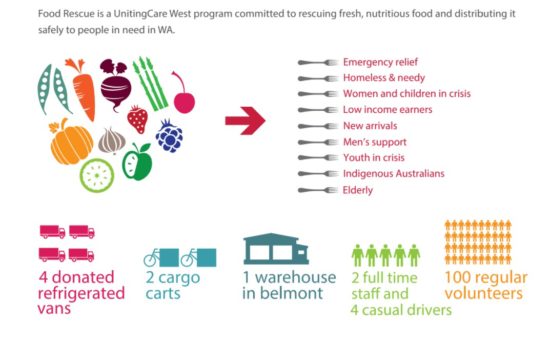
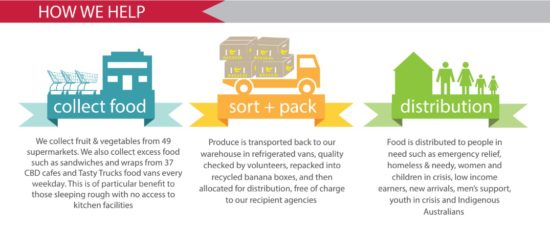
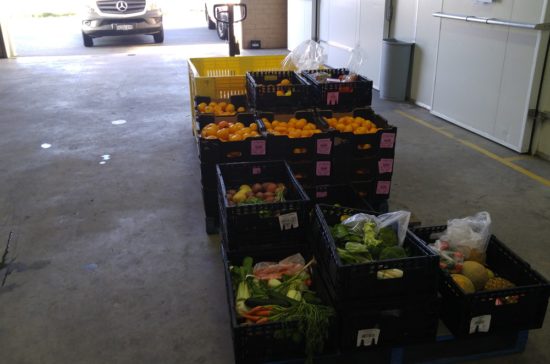
“Waste” products that have arrived and are waiting to be sorted and repacked.
Food arrives here at the Food Rescue WA warehouse in various ways and for various reasons. The black boxes at the front are assorted rejects from the supermarkets. The oranges are an overstock. The yellow container at the back (a cubic metre) comes directly from a farmer, with carrots that don’t meet the cosmetic/size standards.
Food Rescue WA only deal with fresh fruit and vegetables. They also receive eggs for redistribution, and occasionally chilled products.
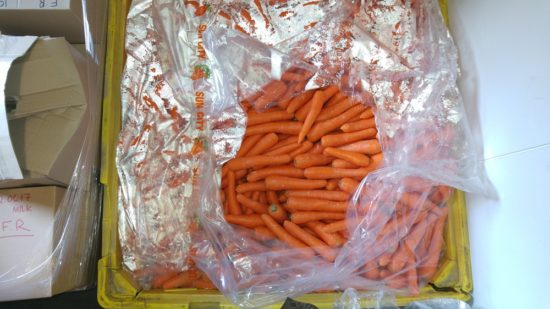
This second yellow container is filled with cosmetically imperfect but completely edible carrots donated by a farmer. The dimensions of the container are 1m x 1m x 1m (a cubic meter).
The food is then sorted by volunteers and distributed into boxes (old banana boxes). The food is distributed so that each box has variety and colour, and looks visually appealing.
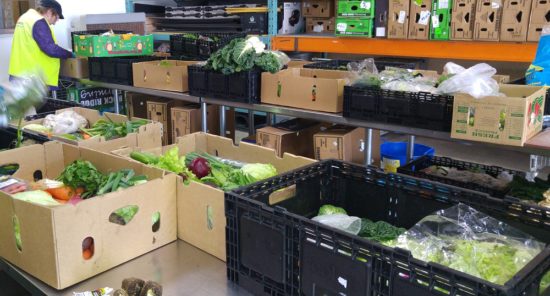
Sorting food and packing into boxes..
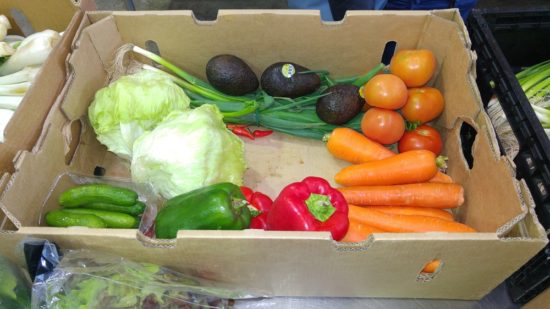
A partially packed veg box…
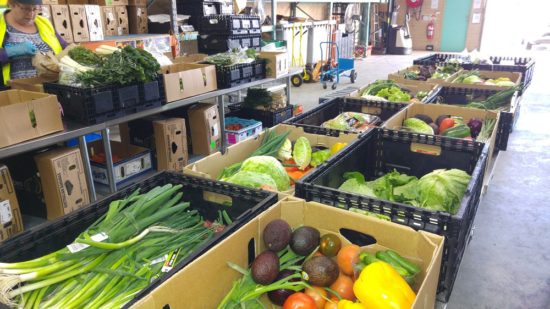
Boxes of colourful, edible food saved from the bin and ready to be distributed by the Food Rescue WA vans to people in need.
Food Rescue WA currently operates from Monday to Friday, but they may expand into weekends. The volunteers arrive at 7am and sorting and packing is generally completed by 10am. The boxes are then delivered, with all charities in receipt of their food by 11.30am.
What happens next is up to the charities. Some cook meals using the ingredients; others allow people to take the boxes home to cook for their families.
This operation provides 11,000 meals a week. That’s impressive in itself, but there’s more. Food Rescue WA don’t just fight food waste, though. They fight other waste too.
Plastic
Firstly, they sort and recycle all of their packaging. They have a plastics recycling system where plastics are separated into their different types (numbers) and then this is collected by CLAW Environmental for recycling.
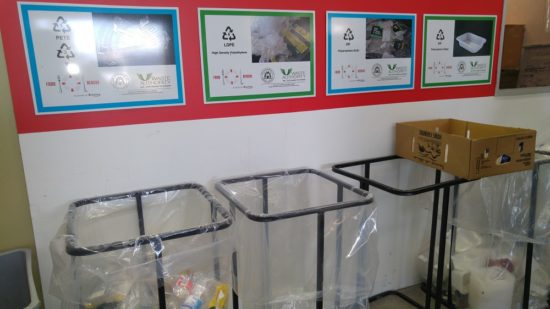
They even go one step further and remove all the plastic packaging from the boxes they are donating to the charities. They realise that the charities won’t have the time or capacity to recycle the soft plastic, and may not have the knowledge to sort it correctly either.
By removing the plastic before it is distributed, it saves the charity workers a job and also the disposal costs, and ensures it gets recycled properly.
Food Rescue WA currently recycles 4 cubic meters of soft plastic a week.
Cardboard
The food received by charities is packed into banana boxes which can be returned for re-use. Typically a driver will deliver new boxes, collect old empty ones and they will be re-used for packing. Each box can be used several times before it begins to wear out. The cardboard is then recycled.
Food Waste
Food Rescue WA have an innovative composting machine called the Orca that aerobically digests unusable food waste rapidly, and produces a liquid effluent that can be safely discharged into the municipal sewerage system.
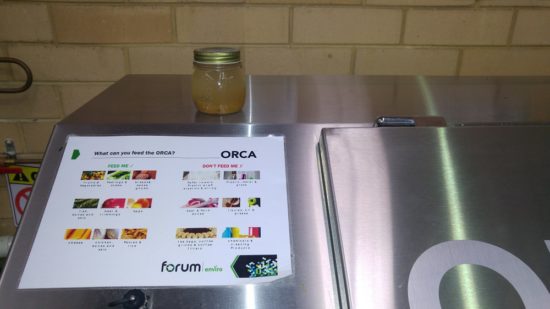
The jar of apple sauce on top of the machine is in fact the liquid effluent which comes out of the machine after the contents are aerobically digested, and have passed through a grease trap and filter system.
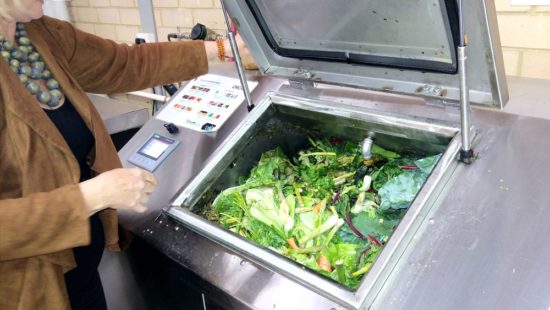
These fresh veggies were added…
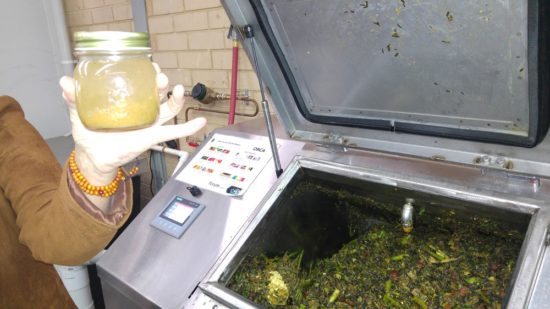
…and 15 minutes later they were well on their way to breaking down. The food waste has no smell, or if anything, it smells like a fresh green salad!
Food Rescue WA did secure backing to fund a composter in the past, but unfortunately could not get council approval to install it.
Fighting Food Waste: What Can I Do?
There’s plenty of things we can do as individuals to reduce our food waste at home. We can reduce what we buy, learn to understand the different ‘Best Before’ and ‘Use By ‘codes, and also learn how to tell if something is good or bad without relying on the packaging telling us. We can learn new ways to cook things, embrace home composting and get more organized so there are no longer unidentified objects that used to be food lurking at the back of our fridges. (For more ideas, here’s 12 tips to reducing food waste.)
But we can go one step further. We can support these organisations working to reduce food waste. Here’s three ideas:
Volunteer for a few hours at a Food Rescue service such as Food Rescue WA and donate your time to help collect, sort and redistribute food that’s headed to landfill to people who need it. Or if you have a specialised skill that you think may be of use, offer these services!
Donate to the cause. These organisations run on volunteer hours and donated food, but still need to pay for utilities, fuel and maintenance to keep the operation running. Donating money directly to these organizations is better than buying food from supermarkets to donate. There’s already plenty of food out there that needs rescuing, and supermarkets really don’t need our money – the charities do!
Share their story! Tell your local cafe, restaurant, workplace, supermarket, greengrocer or farmer about these services, and encourage them to use them and support the work that they do.
If you’d like to get involved with or support Food Rescue WA, you can find more information here.
Now I’d love to hear from you! What solutions do you have for reducing food waste – at home, at work or in your local community? What organisations are doing great things in your local community and how could you support their work? Any thoughts on the story I’ve shared? Anything else you’d like to add? Please leave a comment below!
[leadpages_leadbox leadbox_id=1429a0746639c5] [/leadpages_leadbox]

